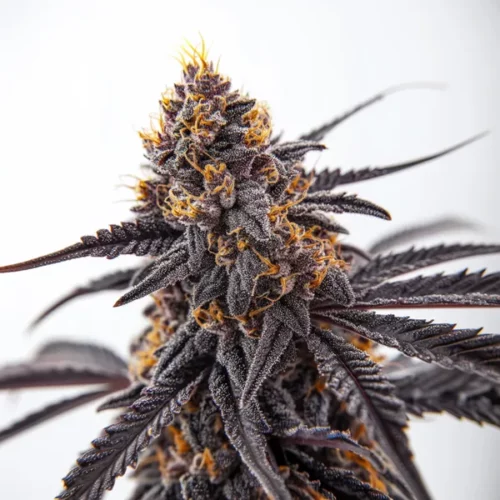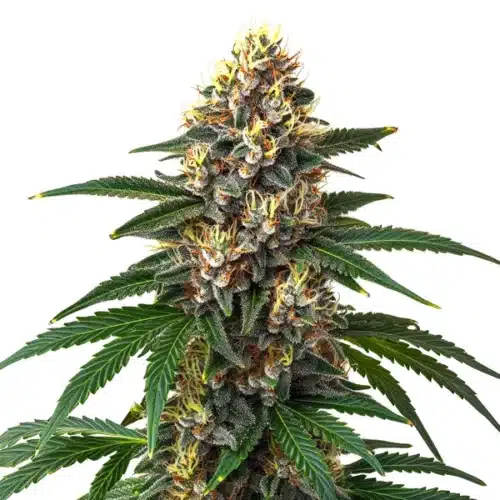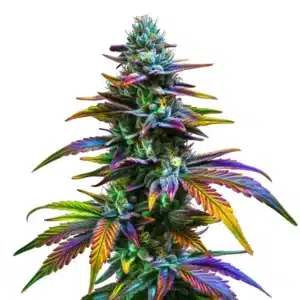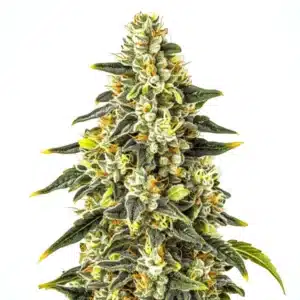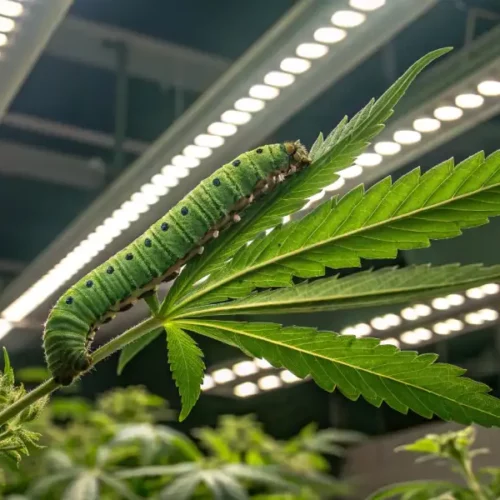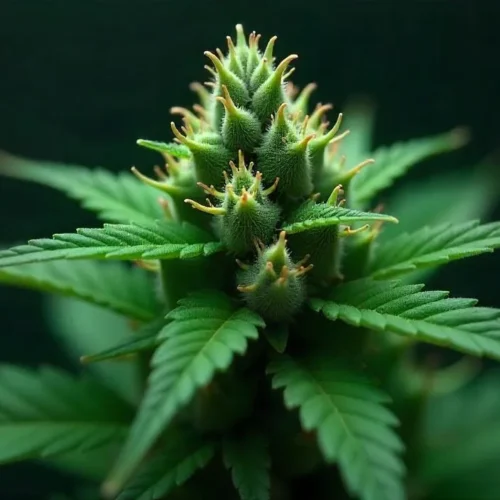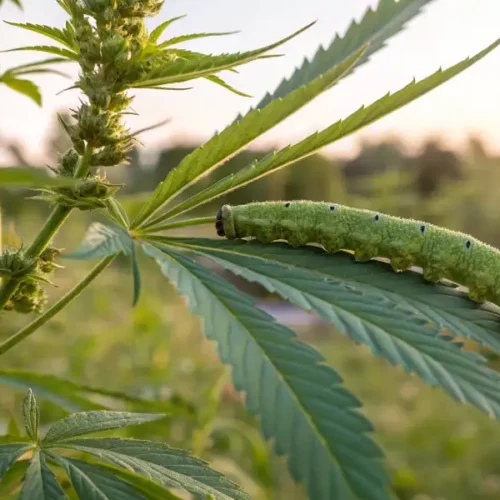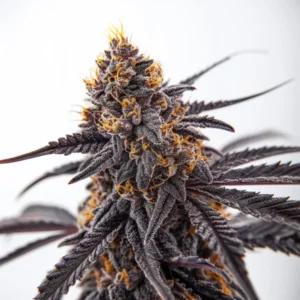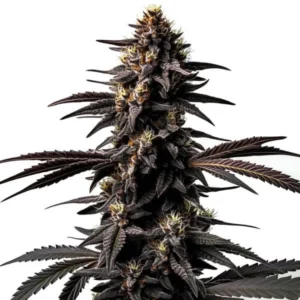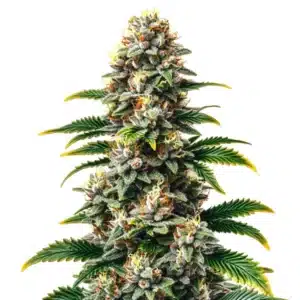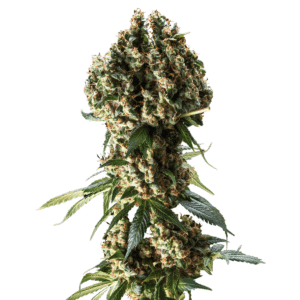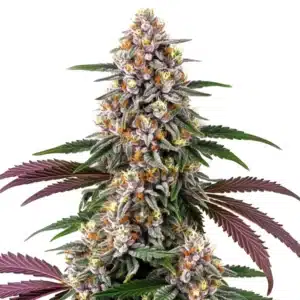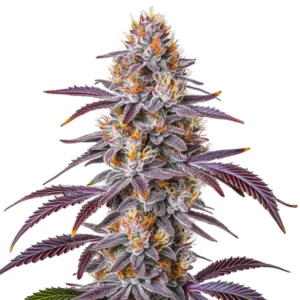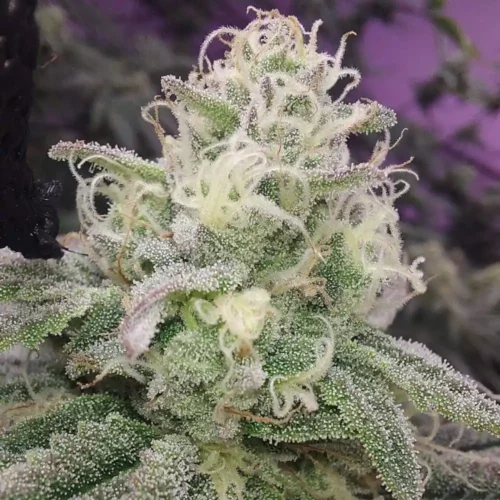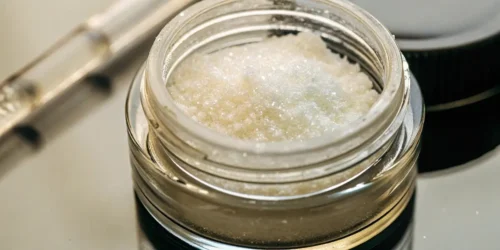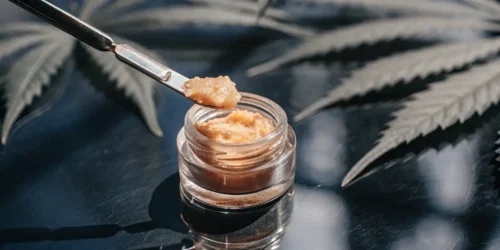Donnie Burger Weed Strain Description
Donnie Burger Strain is a potent hybrid that has captivated cannabis enthusiasts with its impressive combination of effects, flavors, and yields. This strain is particularly favored by those seeking a well-balanced experience, offering a blend of both indica and sativa effects. With its robust lineage and exceptional terpene profile, Donnie Burger is a strain that stands out in both recreational and medicinal cannabis markets.
This strain is a cross between the classic GMO (Garlic Cookies) and Han-Solo Burger. This hybrid strain delivers a high THC content, often reaching levels between 25% and 30%. This high Donny Burger THC level makes it ideal for experienced consumers seeking strong effects. The buds of Donnie Burger are typically dense, resin-coated, and feature a vibrant mix of green hues with amber pistils. When handled, these buds leave a sticky residue due to their high resin content.
Recommended Strains
Donny Burger
 THC: 27% - 30%
THC: 27% - 30% Type of seed: Feminized
Type of seed: Feminized Phenotype: Mostly Indica
Phenotype: Mostly Indica Day to flower: 9 - 10 weeks
Day to flower: 9 - 10 weeks
Candy Kush
 THC: 14% - 19%
THC: 14% - 19% Type of seed: Feminized
Type of seed: Feminized Phenotype: Mostly Indica
Phenotype: Mostly Indica Day to flower: 8 - 10 weeks
Day to flower: 8 - 10 weeks
Donnie Burger Weed Strain’s flavor profile is rich and complex. The primary flavors include earthy, garlic-like tones with a subtle sweetness on the exhale. Its aroma is equally distinctive, offering strong notes of diesel, herbs, and spices, creating a pungent yet appealing scent. Combined, these characteristics make Donnie Burger a memorable strain in both taste and smell.
Promos & Deals
Environmental Requirements for Growing Donnie Burger
To cultivate Donnie Burger Weed Strain successfully, creating an optimal environment is essential. This strain flourishes in a temperate climate, similar to other high-THC cannabis strains. It thrives in temperatures ranging between 70°F and 80°F (21°C to 27°C) during the day, with slightly cooler nighttime temperatures. Ensuring a stable temperature is key to promoting healthy growth and preventing stress-related issues.
Indoor growers will need to provide ample lighting to stimulate growth. High-intensity LED or HPS lights are recommended, particularly during the vegetative stage, where the strain benefits from 18 to 20 hours of light per day. When transitioning to the flowering phase, reducing the light to a 12/12 schedule (12 hours light and 12 hours dark) will trigger the production of dense, resin-rich buds.
Outdoor growers should ensure that the strain is cultivated in a location that receives plenty of sunlight. Donnie Burger performs well in warm, sunny environments. If growing in cooler climates, utilizing a greenhouse can extend the growing season and offer protection from temperature fluctuations.
Setting Up the Growing Cannabis Space
Indoor Cannabis Cultivation
When cultivating Donnie Burger Weed Strain indoors, setting up a proper grow tent or room is critical. Ensure that the space has adequate ventilation to maintain airflow and prevent humidity-related issues such as mold. Installing fans and exhaust systems with carbon filters will also help control the strong odor Donnie Burger is known for during its flowering stage.
The choice of growing medium can vary between high-quality soil and hydroponic systems, depending on the grower’s preference. Soil offers a more traditional and forgiving growing experience, while hydroponic setups can yield faster growth and larger harvests. Ensure that the medium is well-draining and that pH levels are kept within the ideal range of 6.0 to 6.5 to promote optimal nutrient absorption.
Outdoor Cannabis Cultivation
For outdoor growers, selecting the right location is key. Donnie Burger thrives in areas with long hours of sunlight. Ensure that the soil is rich in organic matter and well-draining. If soil conditions are poor, using large containers or fabric pots with high-quality soil mixes can greatly improve plant health. Additionally, protecting the plants from strong winds with barriers or trellises is recommended.
Supporting the branches with stakes or ties can prevent them from snapping under the weight of Donnie Burger’s dense buds, especially as the plants mature. Pruning lower branches that receive less light can also enhance airflow and light penetration to the upper canopy.
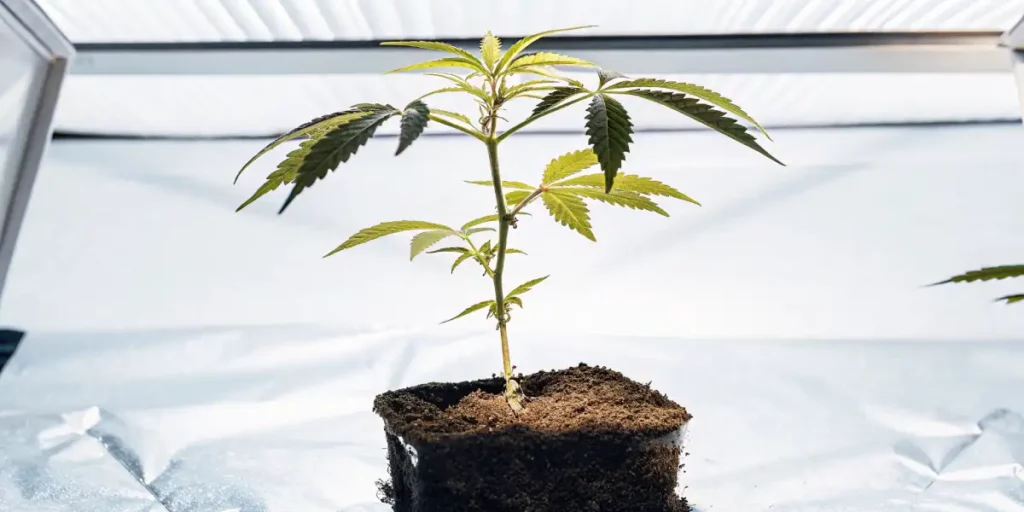
Propagation and Germination of Donnie Burger Weed Strain
Starting Donnie Burger Weed Strain from seeds is a straightforward process that can lead to high germination rates when done correctly. Begin by selecting high-quality feminized seeds from reputable sources. This ensures that the plants are genetically stable and reduces the likelihood of male plants appearing in the garden.
To germinate the seeds, soak them in distilled water for 24 to 48 hours or place them between damp paper towels. Keep the seeds in a warm, dark place with a temperature between 70°F and 85°F (21°C to 29°C) to encourage the development of healthy taproots. Once the taproots appear, carefully transfer the seeds to a pre-moistened growing medium.
During the seedling stage, maintain a warm and humid environment, with temperatures around 75°F to 80°F (24°C to 27°C) and humidity levels at 60-70%. Gradually increase light exposure as the seedlings develop, taking care not to stress them with too much light early on. After the seedlings establish a few sets of true leaves, they can be transplanted into larger pots or directly into the outdoor garden.
Vegetative Phase of Donnie Burger Strain
The vegetative phase is a critical period for Donnie Burger Weed Strain, during which the plants will focus on growing strong branches and healthy foliage. This phase typically lasts between 4 to 8 weeks, depending on the grower’s preference and the specific growing environment.
Lighting: During this phase, provide Donnie Burger with 18 to 20 hours of light per day. High-quality LED or HPS lights work best for stimulating vigorous growth, ensuring the plants develop a robust structure that can support the heavy buds later in the flowering stage.
Nutrition: During the vegetative phase, feed the plants a nutrient mix with a high nitrogen content to promote strong leaf and stem growth. Monitor the plants closely for any signs of nutrient deficiencies or excesses and adjust the feeding regimen as necessary.
Training: Techniques such as low-stress training (LST) and topping can be used to control the height of the plants and promote an even canopy. These methods increase light penetration and airflow, resulting in better bud development when the plants transition to the flowering phase.
Flowering Phase of Donnie Burger Weed Strain
The flowering phase is when Donnie Burger begins to develop its dense, resinous buds. The typical Donny Burger flowering time is between 8 to 10 weeks, depending on the growing conditions and the specific phenotype of the strain.
Lighting: To initiate flowering, switch to a 12/12 light cycle. This signals the plants to stop vegetative growth and start producing buds. Keep the lights at a consistent distance from the canopy to prevent light burn, while ensuring that the plants receive sufficient intensity for optimal bud development.
Temperature and Humidity: Lower the temperature slightly to around 65°F to 75°F (18°C to 24°C) during the flowering phase to encourage resin production. Humidity levels should be reduced to 40-50% to prevent mold or bud rot, especially as the buds become denser.
Support: Donnie Burger’s heavy buds may require additional support. Use trellises, stakes, or nets to prevent the branches from snapping under the weight of the flowers.
Cannabis Fertilization and Nutrition
Providing the right nutrients at the right time is essential to ensure the health and productivity of Donnie Burger Weed Strain. During the vegetative stage, use a balanced fertilizer rich in nitrogen (N). As the plants transition into the flowering stage, switch to a bloom-specific fertilizer with higher levels of phosphorus (P) and potassium (K) to support bud development.
Additionally, incorporating organic additives like beneficial microbes and enzymes can enhance nutrient uptake and improve soil health. Flushing the plants with clean water during the final two weeks of flowering is essential to remove excess nutrients, ensuring a clean and flavorful harvest.
Pest And Disease Control for Cannabis Growing
Like all cannabis strains, Donnie Burger Weed Strain is susceptible to certain pests and diseases. Implementing preventative measures is crucial for protecting your plants. Ensure proper ventilation in indoor grows to avoid high humidity, which can lead to mold. Additionally, inspecting plants regularly for pests like spider mites, aphids, and thrips can help detect problems early.
Introducing beneficial insects, such as ladybugs or predatory mites, is an organic method to control pest populations. Organic pesticides like neem oil or insecticidal soaps can also be used if infestations occur. Maintaining a clean and tidy grow space will go a long way in preventing the spread of diseases.
Harvesting and Curing Donnie Burger Weed Strain
Knowing when to harvest your Donnie Burger plants is crucial for ensuring a potent, flavorful final product. Trichome maturity is the best indicator of when to harvest. Using a magnifying tool, inspect the trichomes, which should appear milky or cloudy with some amber tones, indicating peak cannabino id levels of THC and terpenes. Once the trichomes have reached this stage, use sterilized scissors or pruning shears to carefully cut down the branches.
Drying: Hang the trimmed branches upside down in a cool, dark, and well-ventilated area with temperatures between 60°F and 70°F (15°C to 21°C) and humidity levels of 50-60%. Proper airflow is crucial during this phase to avoid mold formation. Drying typically takes between 7 to 14 days, depending on environmental conditions.
Curing: Once the buds are adequately dried, carefully remove them from the branches and place them in airtight glass jars for curing. Store the jars in a cool, dark place and open them daily during the first week to allow any excess moisture to escape. This process, called “burping,” helps preserve the terpenes and enhances the overall flavor and potency. Curing usually lasts between two and four weeks but can be extended for those seeking an even smoother smoke.
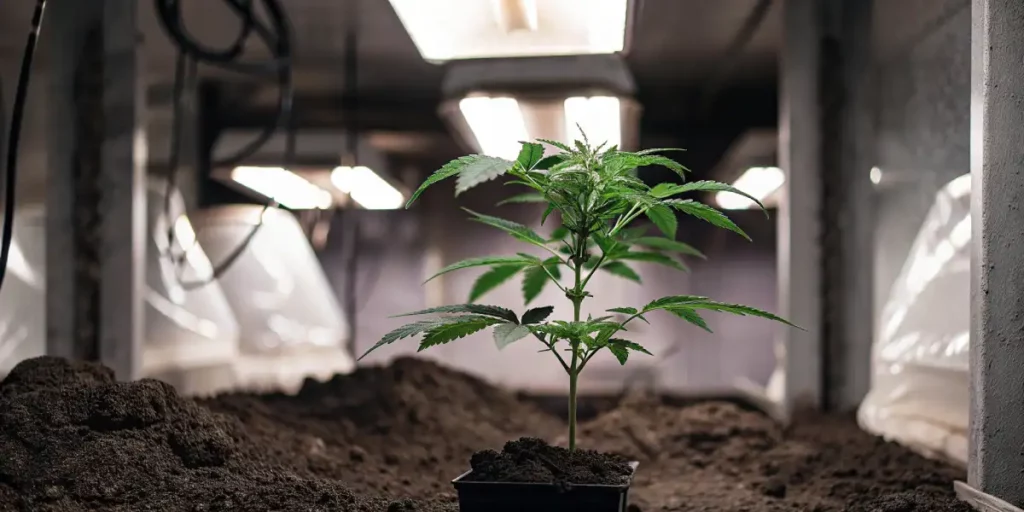
Is Donnie Burger Weed Strain Indica or Sativa?
Donnie Burger Weed Strain is a balanced hybrid with a slight indica dominance, typically offering a 60/40 indica to sativa ratio. This genetic profile means that consumers can expect a blend of physical relaxation, characteristic of indica strains, coupled with cerebral stimulation associated with sativa varieties.
The strain’s indica side tends to dominate the initial effects, offering a calming body high that can be beneficial for stress relief and muscle relaxation. However, Donnie Burger’s sativa genetics also provide an uplifting and euphoric cerebral experience, making it suitable for socializing or creative endeavors.
Advantages of Growing Donnie Burger Weed Seeds
Donnie Burger Weed Strain offers numerous advantages that make it an appealing choice for cannabis cultivators:
- High THC content, often reaching between 25% and 30%.
- Unique, potent aroma with flavors of garlic, diesel, and herbs.
- Resilient growth with a relatively short flowering time of 8-10 weeks.
- Suitable for both indoor and outdoor cultivation.
- Produces large, resin-covered buds with heavy yields.
Disadvantages of Growing Donnie Burger Weed Strain
- Strong, pungent aroma may require odor control methods in indoor grows.
- Dense buds may be prone to mold or mildew in high-humidity environments.
- May require support structures to prevent branches from snapping under the weight of the buds.
- Challenging for beginners due to its high nutrient demands and potential pest issues.
Why Buy Donnie Burger Weed Strain
Donnie Burger Weed Strain is an excellent choice for those seeking a high-potency strain with a complex flavor profile and balanced effects. Here are a few reasons why you should consider purchasing this strain:
1. Potent THC Levels: With THC levels reaching up to 30%, Donnie Burger is ideal for experienced users looking for a powerful and long-lasting high.
2. Rich Flavor Profile: This strain offers a distinctive blend of garlic, diesel, and earthy flavors that make it stand out from other strains.
3. High Yields: Donnie Burger is known for its large, dense buds that produce generous yields, making it a favorite among commercial and home growers alike.
4. Medicinal Benefits: Thanks to its indica-dominant effects, Donnie Burger is commonly used to manage pain, stress, and insomnia. Its sativa characteristics also provide mood-lifting effects, making it a versatile option for medical users.
Problems in Cultivating Donnie Burger Weed Strain
Though Donnie Burger Weed Strain is a robust plant, it is not without its challenges. Here are some common issues cultivators may encounter:
1. Pest Control: This strain is susceptible to pests like spider mites, thrips, and aphids. Regular monitoring and preventative measures are essential to keep these pests at bay.
2. Odor Management: Donnie Burger’s strong scent can become overwhelming, especially in indoor grows. Install carbon filters or other odor management systems to keep the smell under control.
3. Mold and Mildew: Due to its dense bud structure, Donnie Burger can be prone to mold and mildew, particularly in high-humidity environments. Ensuring proper airflow and keeping humidity levels in check will help mitigate this risk.
4. Nutrient Sensitivity: While Donnie Burger requires a nutrient-rich feeding schedule, it can also be sensitive to nutrient imbalances. Be mindful of overfeeding or nutrient lockout, and flush the plants regularly to prevent buildup.
Similar Strains to Donnie Burger Weed Strain
If you enjoy Donnie Burger Weed Strain, you might also be interested in these similar strains:
- GMO Cookies: A heavy-hitting indica hybrid that shares Donnie Burger’s pungent garlic aroma and strong THC levels, making it a fan favorite for those who enjoy bold flavors.
- Chemdawg 4: Known for its pungent diesel aroma and cerebral effects, Chemdawg 4 is a legendary strain that provides a powerful high and high yields, much like Donnie Burger.
Tips for Professional Growers
For experienced growers looking to get the most out of their Donnie Burger crop, here are a few tips:
1. Utilize Low-Stress Training (LST): LST can be highly effective in maximizing yields by promoting an even canopy and allowing more light to reach lower branches. This technique also helps manage the plant’s height, making it easier to grow indoors.
2. Implement a CO2 System: Professional growers may want to introduce supplemental CO2 during the flowering phase to enhance bud growth and increase yields.
3. Keep a Close Eye on Humidity: Due to Donnie Burger’s dense bud structure, controlling humidity levels is essential. Keep humidity levels around 50% during flowering and ensure proper airflow to avoid mold and mildew issues.
4. Monitor Nutrient Levels: Regularly test the pH and EC of your nutrient solution to ensure your plants are getting the right balance of nutrients without overfeeding. Flushing the plants periodically can also help prevent nutrient lockout.
FAQs
What is the THC content of Donnie Burger Weed Strain?
Donnie Burger typically has a THC content between 25% and 30%, making it one of the more potent strains available.
How long does Donnie Burger Weed Strain take to flower?
Donnie Burger has a flowering period of approximately 8 to 10 weeks, depending on the growing conditions and phenotype.
Can beginners grow Donnie Burger Weed Strain?
While Donnie Burger can be grown by beginners, it is recommended for growers with some experience due to its nutrient sensitivity and strong odor, which requires proper management.
What are the medicinal benefits of Donnie Burger Weed Strain?
Donnie Burger is commonly used for its relaxing effects, making it helpful for managing chronic pain, stress, and insomnia. Its mood-lifting properties also make it beneficial for individuals dealing with depression or anxiety.
What is the flavor profile of Donnie Burger Weed Strain?
Donnie Burger features a rich flavor profile with earthy, garlic, and diesel notes, combined with subtle sweet undertones, making it a bold strain in both taste and aroma.

